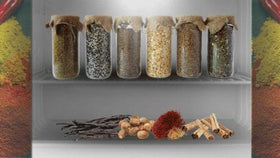Cocoa Powder: Dutch Process vs. Natural
Anyone who has done any degree of cooking or baking has probably come across cocoa powder in their recipes. Whether it be making simple brownies, a rich and creamy Brazilian hot cocoa, decadent chocolate ganache, or even mole-eske chili con carne, cocoa powder often presents itself in the list of ingredients. But few folks beyond seasoned bakers and professional chefs realize there are two main types of cocoa: Dutch process and natural cocoa powder, each with its own distinct characteristics and best uses. In this article, we'll explore the differences between Dutch process and natural cocoa powder to prepare you for choosing the best cocoa powder variety for your recipe.
The Difference Between Dutch Process and Natural Cocoa Powders
What is Natural Cocoa Powder?
Natural cocoa powder is the purest form of cocoa powder, made from roasted cocoa beans with much of the fat (cocoa butter) removed. The process begins with harvesting ripe cocoa pods, fermenting and drying the beans, and then roasting them to intensify their chocolaty flavor. After roasting, the beans are heated to remove most of the fat, then cooled, dried, and ground into a fine powder to produce what we know as natural cocoa powder.
One of the key characteristics of natural cocoa powder is its acidity. In their pure form, cocao beans are quite acidic, which contributes to a somewhat fruity flavor profile, with a pronounced chocolate taste that can be perceived as bold and bitter. This acidity can lend a tangy, bright note to recipes and works exceptionally well in recipes that call for baking soda as a leavening agent. The reaction between the acidity of natural cocoa powder and baking soda produces carbon dioxide gas, leading to a lighter and fluffier texture in baked goods.
What is Dutch Process Cocoa Powder?
Dutch process cocoa powder, on the other hand, undergoes an additional step in processing—being washed in an alkali solution that neutralizes their acidity. This solution is typically comprised of potassium carbonate, which is an inorganic substance that is primarily kn own for its use in glass and soap production.
This process works to balance the pH levels, decreasing the acidity, which results in a cocoa powder that tends to be milder in flavor, darker in color, and less bitter. Dutch process cocoa powder is known for being smoother and less pronounced in its chocolatey tones, compared to natural cocoa powder. It's often preferred in recipes that already contain alkaline agents like baking powder, as the lack of acidity in Dutch process cocoa won't react with them to the same extent as natural cocoa.
When it comes to choosing the perfect cocoa powder, for us natural cocoa powder stands out as a superb choice in most instances. We adore the natural flavor of well-cared-for cacao beans and welcome the natural acidity in their flavor profile, with its pure and unadulterated essence. Our Ecuadorian Cocoa Powder is crafted from meticulously roasted cocoa beans. They have a hint of fruity acidity, with a rich chocolate flavor, and the perfect amount of natural fat from the cocoa butter, which leads to a silky smooth end product.










Slofoodgroup
Autor